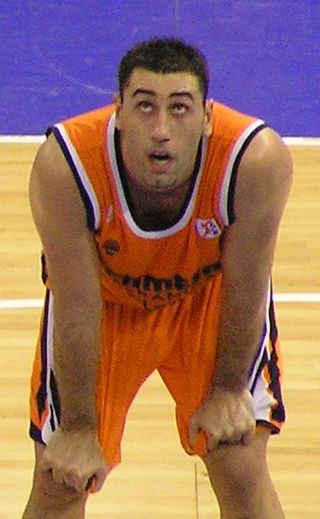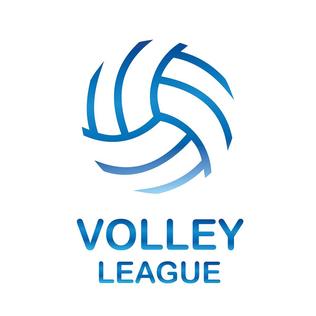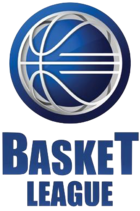
The Super League Greece 1, or Stoiximan Super League for sponsorship reasons, is the highest professional association football league in Greece. The league was formed on 16 July 2006 and replaced Alpha Ethniki at the top of the Greek football league system. The members of the cooperative are the Football Limited Companies (P.A.E.) that have the right to participate in the Super League 1 championship. The president of Super League 1 is Vangelis Marinakis, who has been re-elected for the third time.

Dimosthenis "Dimos" Dikoudis, is a former Greek professional basketball player and basketball executive. He is 2.08 m tall, and he played as a power forward-center. Dikoudis was inducted into the Greek Basket League Hall of Fame in 2022.
The Greek Basketball Cup or Hellenic Basketball Cup is the top-tier level annual professional basketball national cup competition in Greece. It is organized by the Hellenic Basketball Federation (E.O.K.).
The 2007–08 Greek Basket League season was the 68th season of the Greek Basket League, the highest tier professional basketball league in Greece. The winner of the championship was Panathinaikos that won Olympiacos in the finals of the championship.

The A1 Ethniki, often referred to as the Greek Volleyball League, is the highest professional volleyball league in Greece. It is run by the Hellenic Volleyball Federation. It is considered one of the top national leagues in European volleyball, as its clubs have made significant success in European competitions.

Vladimir "Vlado" Janković is a Serbian-Greek professional basketball player who last played for Karditsa of the Greek Basket League. Standing at 2.02 m, he plays as a small forward. He is the son of the late Serbian professional basketball player Boban Janković.
The 2008–09 Greek Basket League season was the 69th season of the Greek Basket League, the highest tier professional basketball league in Greece. The 182-game regular season began on Saturday, October 4, 2008, and ended on Sunday, May 10, 2009. The playoffs ended on June 3, 2009.
Basketballin Greece erupted with the win of the Greece men's national basketball team at the 1987 EuroBasket in Athens, which caused a general basketball euphoria in the country. Since then, the Greece men's national teams have achieved consistent international success, leading Greece to join Russia, Serbia, Croatia, Italy, Spain, France, and Lithuania in the circle of European basketball powers. In addition to the Greece national team's triumph in 1987, they won the gold medal at the 2005 EuroBasket, silver medals at the 1989 EuroBasket, and the 2006 FIBA World Cup, and the bronze medal at the 2009 EuroBasket.
The 2010–11 Greek Basket League was the 71st season of the Greek Basket League, the highest tier professional basketball league in Greece. The 182-game regular season began on Saturday, October 4, 2010, and ended on Wednesday, April 20, 2011. The league's playoffs ended on June 8, 2011.
The 2009–10 Greek Basket League season was the 70th season of the Greek Basket League, the highest tier professional basketball league in Greece. The winner was Panathinaikos that won Olympiacos in the finals of the championship.

Aleksandar Vezenkov, most commonly known as Sasha Vezenkov, is a Bulgarian professional basketball player for Olympiacos of the Greek Basket League (GBL) and the EuroLeague.
The 2004–05 Greek Basket League season was the 65th season of the Greek Basket League, the highest tier professional basketball league in Greece. It was also the 13th season of Greek Basket League that was regulated by HEBA (ESAKE). The winner of the league was Panathinaikos, which beat AEK Athens in the league's playoff's finals series. The clubs MENT and Ionikos Nea Filadelfeia were relegated to the Greek A2 League. The top scorer of the league was Nikos Oikonomou, a player of Panionios.
The 2003–04 Greek Basket League season was the 64th season of the Greek Basket League, the highest tier professional basketball league in Greece. It was also the 12th season of Greek Basket League championship that was regulated by HEBA (ESAKE). The winner of the league was Panathinaikos, which beat Maroussi in the league's playoff's finals series. The clubs Irakleio and Ilysiakos were relegated to the Greek A2 League, along with Peristeri, which was relegated because it faced financial problems. The top scorer of the league was Nestoras Kommatos.
The 2002–03 Greek Basket League season was the 63rd season of the Greek Basket League, the highest tier professional basketball league in Greece. It was also the 11th season of the Greek Basket League championship that was regulated by HEBA (ESAKE). The winner of the league was Panathinaikos, which beat AEK Athens in the league's payoff's finals. The clubs Near East and Olympia Larissa were relegated to the Greek A2 League. The top scorer of the league was Georgios Diamantopoulos, a player of Panionios. Fragiskos Alvertis, a player of Panathinaikos, was voted the MVP of the league.
The 2001–02 Greek Basket League season was the 62nd season of the Greek Basket League, the highest tier professional basketball league in Greece. It was also the 10th season of Greek Basket League championship that was regulated by HEBA (ESAKE). The winner of the league was AEK Athens, which beat Olympiacos in the league's playoff's finals. The clubs Dafni and KAOD were relegated to the Greek A2 League. The top scorer of the league was Nikos Chatzivrettas, a player of Iraklis. Dimos Dikoudis, player of AEK Athens, was named the MVP of the league.
The 2000–01 Greek Basket League season was the 61st season of the Greek Basket League, the highest tier professional basketball league in Greece. It was also the 9th season of Greek Basket League championship that was regulated by HEBA (ESAKE). The winner of the league was Panathinaikos, which beat Olympiacos in the league's playoff's finals. The clubs Milon and Makedonikos were relegated to the Greek A2 League. The top scorer of the league was Alphonso Ford, a player of Peristeri. Alphonso Ford was also named the MVP of the league.
The 1999–2000 Greek Basket League season was the 60th season of the Greek Basket League, the highest tier professional basketball league in Greece. It was also the 8th season of Greek Basket League championship that was regulated by HEBA (ESAKE). The winner of the league was Panathinaikos, which beat PAOK in the league's playoff's finals, although the regular season winner was Olympiacos. The clubs Sporting and Esperos were relegated to the Greek A2 League. The top scorer of the league was Alphonso Ford, a player of Peristeri. Željko Rebrača was voted the MVP of the league.

Konstantinos "Dinos" Mitoglou is a Greek professional basketball player and the vice-captain for Panathinaikos of the Greek Basketball League (GBL) and the EuroLeague. He played college basketball at Wake Forest University. He is a 2.10 m tall power forward, who can occasionally play as a center.
The 2019–20 Greek betshop.gr Basket League was the 80th season of the Greek Basket League, the top-tier level professional club basketball league in Greece. The season started in September 2019, and ended prematurely in March 2020, due to the COVID-19 pandemic. On 21 May 2020, after a vote that was held between the league's 14 teams, Panathinaikos was crowned the Greek basketball league's champion for the season, marking the club's 38th Greek championship. The league's 14 teams also agreed that none of the teams would be relegated.
The Greek Basketball Super Cup or Hellenic Basketball Super Cup, is the top-tier level professional basketball national super cup competition in Greece. The first edition of the tournament, was organized by the Hellenic Basketball Federation (E.O.K.), in 1986. It was contested by the Greek Basket League champions and the Greek Basketball Cup winners. However, the Greek Basketball Super Cup was revived in 2020, by the Hellenic Basketball Association (HEBA), under a final four tournament format.












